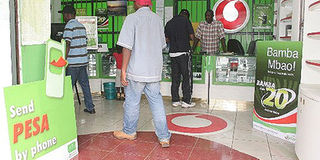Treasury gives M-Pesa a clean bill of health

Customers at an MPesa service outlet in Nairobi. An audit by the Central Bank of Kenya (CBK) has found the service safe and reliable. Photo/FILE
The government has given the M-Pesa money transfer service a clean bill of health putting to rest the controversy that has been surrounding the service over its reliability.
M-Pesa, which in December hit five million subscribers has become so popular that in August it had a turnover of Sh17 billion, according to Treasury.
In a statement, the Permanent Secretary in the Ministry of Finance, Joseph Kinyua, said that an audit by the Central Bank of Kenya (CBK) found the service safe and reliable.
“I therefore reiterate that the Treasury and the Central Bank of Kenya are committed to promoting safe and efficient innovations that enhance access to financial services thereby addressing the challenge of financial exclusion due to infrastructural constraints.”
Ordered audit
Then acting Finance minister, John Michuki, last year ordered an audit of M-Pesa operations citing money laundering concerns.
The issues and risks that had been raised over M-Pesa, Mr Kinyua said, have been mitigated through a number of measures which CBK and the Communication Commission of Kenya (CCK) monitor regularly.
Mr Kinyua said there was no evidence to support the allegation that the service was competing with commercial banks.
“In any case, there is nothing wrong with competition as long as it is pinned by a level playing field,” he said.
On credit risk, Treasury said that since M-Pesa agents pay before offering services to customers, the risk cannot arise.
“CBK has placed the maximum limit of Sh50,000 per M-Pesa account per day and a transaction limit of Sh35,000 per day in order to mitigate against settlement risk,” he said.
Safaricom is part of the Vodafone group, and hence Treasury believes that the M-Pesa product benefits from the research and development of Vodafone and as such, the operational risks are minimal if not non-existent.
The bank has proposed and formulated the enactment of the National Payment System Bill that will strengthen its mandate as an oversight body over all payment systems including money transfer.
Accused
The development is expected to raise reactions from the industry as Safaricom’s competitor, Zain Kenya last week accused the Central Bank of taking too long to licence its money transfer service Zap despite having applied for approval in October last year.
“We have been struggling to get an approval for the past few months unsuccessfully which puts us at a disadvantage to competition,” said Zain Kenya managing director Rene Meza.
Without elaborating that the war may soon find its way to court, Mr Meza said that at the moment ‘all legal options were open to get the service, currently running on a pilot basis.’




